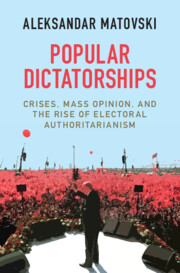Book contents
- Popular Dictatorships
- Popular Dictatorships
- Copyright page
- Dedication
- Contents
- Figures
- Tables
- Acknowledgments
- 1 A “Perfect Dictatorship?” The Puzzle of Electoral Authoritarianism
- 2 Crises, Popular Opinion, and Electoral Authoritarianism
- 3 The Crisis Roots of Electoral Authoritarianism: A Macro-Level Analysis
- 4 The “Strongman” Electoral Authoritarian Appeal: A Comparative Analysis
- 5 Crises, Popular Opinion, and the Realignment of Political Competition in Russia
- 6 Is Russia Unique? The Strongman Heresthetic in Comparative Perspective
- 7 Conclusions and Implications
- Bibliography
- Index
6 - Is Russia Unique? The Strongman Heresthetic in Comparative Perspective
Published online by Cambridge University Press: 04 November 2021
- Popular Dictatorships
- Popular Dictatorships
- Copyright page
- Dedication
- Contents
- Figures
- Tables
- Acknowledgments
- 1 A “Perfect Dictatorship?” The Puzzle of Electoral Authoritarianism
- 2 Crises, Popular Opinion, and Electoral Authoritarianism
- 3 The Crisis Roots of Electoral Authoritarianism: A Macro-Level Analysis
- 4 The “Strongman” Electoral Authoritarian Appeal: A Comparative Analysis
- 5 Crises, Popular Opinion, and the Realignment of Political Competition in Russia
- 6 Is Russia Unique? The Strongman Heresthetic in Comparative Perspective
- 7 Conclusions and Implications
- Bibliography
- Index
Summary
Chapter 6 tests the generalizability of the book’s analytic framework beyond the Russian case. Examining cross-national opinion data from forty-two electoral autocracies in the 1981-2014 period, drawn from the European and World Values Surveys (EVS, 2011; WVS, 2014) – the broadest available comparative dataset on popular sentiments about politics – it finds that just as in Russia, electoral authoritarian incumbents from across the globe have exploited traumas resulting from unmanageable turmoil in order to reconfigure mass opinion and political competition in their favor. Chapter 6 also shows that this cleavage structure and logic of vote choice differs from those of stable Western democracies, confirming again that the advantages electoral autocracies enjoy at the polls are largely owing to the extraordinarily subversive power of the elected strongman appeal in troubled societies.
Keywords
- Type
- Chapter
- Information
- Popular DictatorshipsCrises, Mass Opinion, and the Rise of Electoral Authoritarianism, pp. 222 - 240Publisher: Cambridge University PressPrint publication year: 2021

